A Description of the KIN-TECH™ Kinship Navigator Model
The Children's Home Network has been offering Kinship Services since 2000. This program has developed into an evidenced based, family driven wraparound model KIN-TECH™ that respects and supports children and families.
The Kinship program has been working with an external evaluator for over 18 years to both evaluate the program design and effectiveness in practice as well as testing new innovations that enhance child and caregiver well being and increasing placement stability and permanency.
The KIN-TECH™ Kinship Navigator program offers centralized intake and referral services, intensive in-home case management and navigation services, support groups as well as leading community collaborative meetings and local partnerships to support relative and non-relative caregivers.
Intended target population
Target population includes those relative caregivers (grandparents, aunts, uncles, cousins, brothers, sisters, or any adult with a close kinship bond with the child) who are providing full time care of a child. For the KIN-TECH™ Kinship Navigator Program, caregivers who are formally involved in the child welfare system AND caregivers who are not involved with the child welfare system are eligible to participate in the program.
Core components and essential functions that define the essence of the program and represent the key building blocks leading to positive outcomes;
• Connect caregiver with a wide variety of supportive, easy-to-access services
• Develop an inclusive community collaborative to support dynamic needs of kin families
• Evaluate the program with valid and reliable measures to promote successful outcomes and develop a replicable model.
KIN-TECH™ Kinship navigator program is social service delivery programs intended to provide grandparents and other relatives raising their kinship children with information and referrals regarding available resources and services specific to their families’ needs, and assist kinship caregivers navigate large, complex service systems, (i.e., child welfare, Medicaid, Temporary Assistance to Needy Families, education) in order to obtain these resources.
Outstanding Results and Impact
CHN's KIN-TECH™ Kinship Navigation program has demonstrated strong results in IMPROVING LIVES and CHANGING LIFE STORIES.
CHN's Kinship results from the KIN-TECH™ demonstration project (2012-2016). The data below reflects children in relative placement will not have a non-relative foster care placement within 12, 24 and 36 months after services were completed as measured by independent verification with Florida Safe Families Network (FSFN)
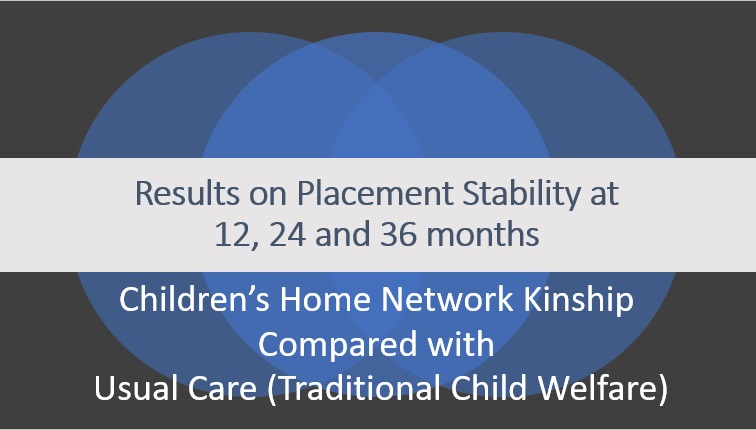
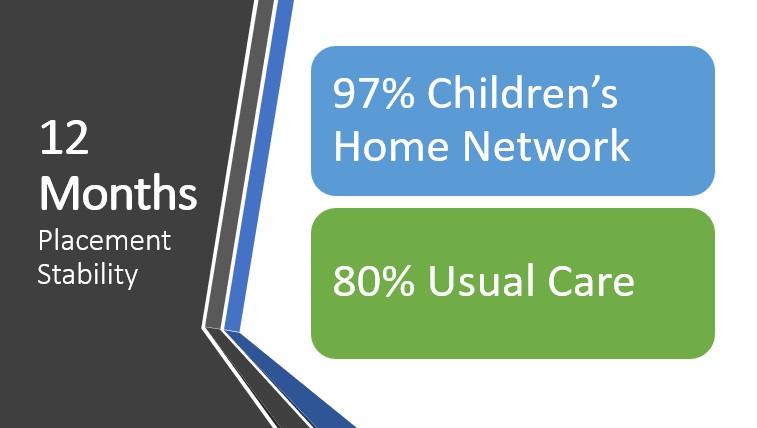
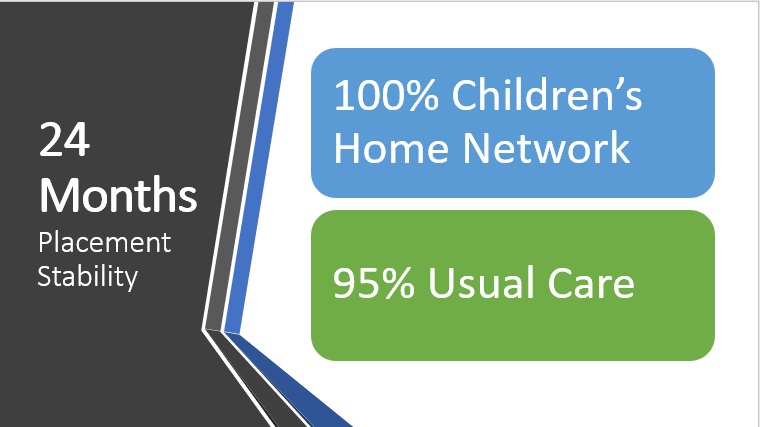
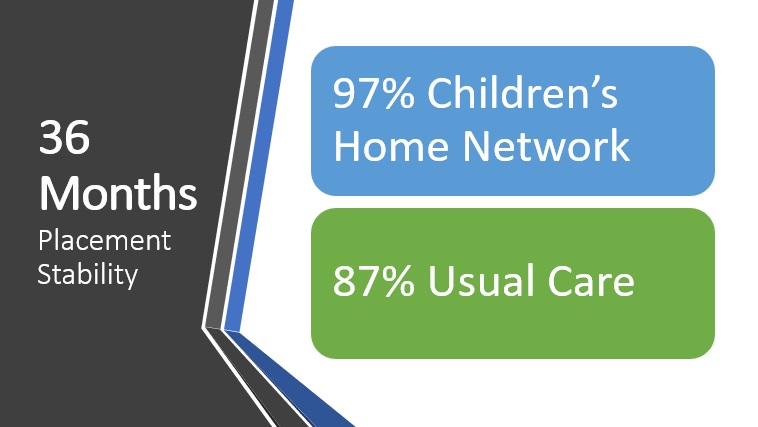
CHN's Kinship Navigation model continues to demonstrate outstanding results for informal families with prevention services.
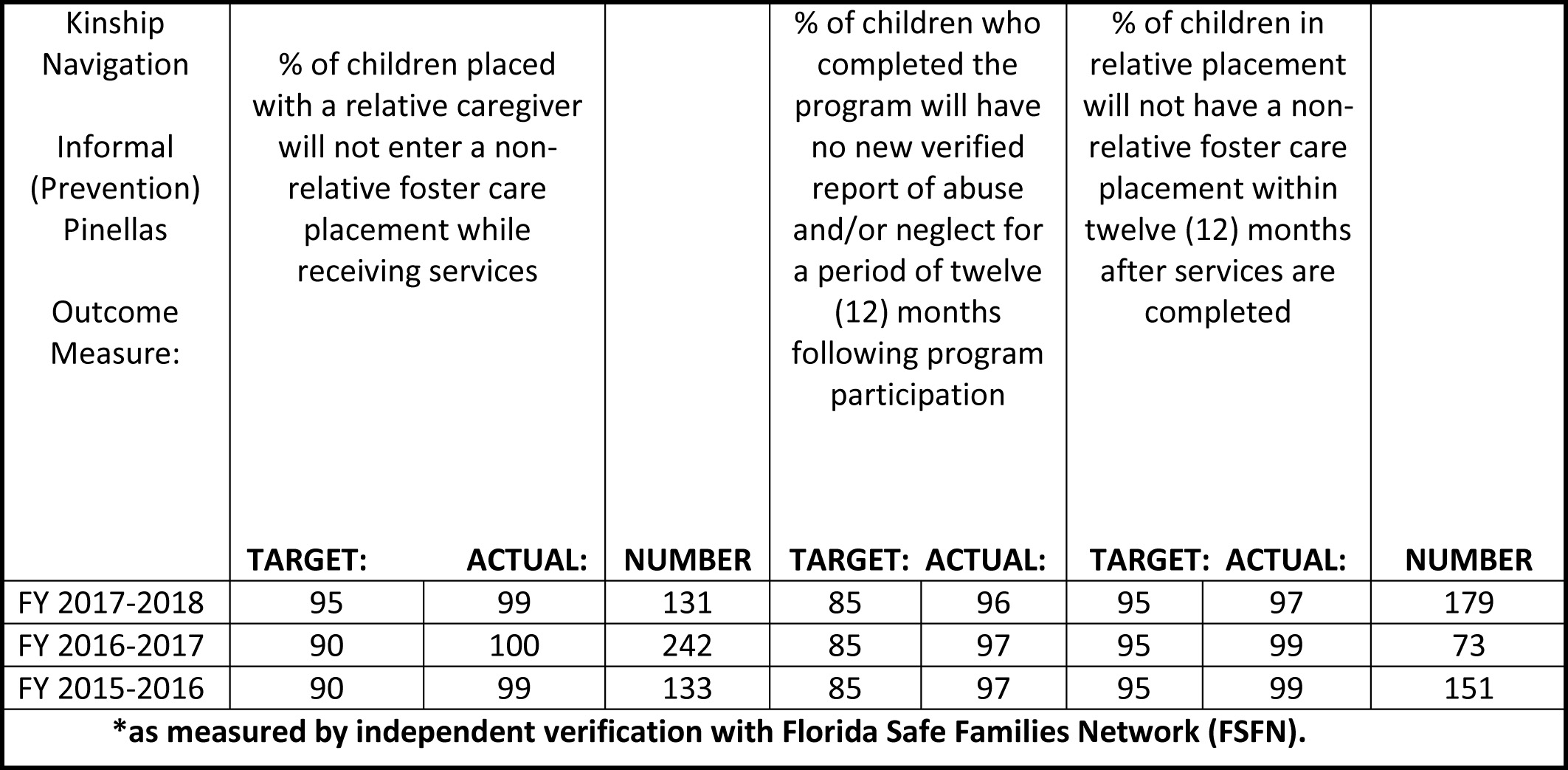
RIGOROUSLY TESTED INNOVATIONS
The Children's Home Network was awarded as one of seven sites nationally to receive a Foster Connections Grant from the Children's Bureau to focus on Kinship Navigation services in 2012. Throughout October 2012-June 2016, The Children’s Home Network designed, implemented and with the expertise of AAJ Research & Evaluation, evaluated the KIN-TECH™ Model using a randomized control trial with over 1550 kinship caregivers in Hillsborough and Pinellas County in Central Florida. We have been able to rigorously test several innovations to enhance CHN's standard Kinship Navigator Program and provide a strong research and evidence base for the model.
KIN-TECH™ Innovations
1. One-e-application
Online service portal site to apply for eligible benefits and services and administered in the home of a relative with a laptop computer;
2. Peer-to-peer support
Hiring grandparents and other relatives who have lived the caregiving experience and can mentor and coach kinship caregivers; and
3. An interdisciplinary team
A cadre of interdisciplinary professionals who unite to help kinship caregivers problem-solve complex issues.
Operational definitions of the core components, including specific actions and behaviors required to carry out the intervention
The Children’s Home Network KIN-TECH™ innovations were designed to meet the most urgent needs of kinship families by implementing several innovative program features, including One-e-App (one-stop-web-based innovation for resources and collateral coordination), Peer-to-Peer Navigation (in-person peer-led, emotional-support-focused system navigation), and Interdisciplinary Team (coordinated team meetings with invested experts).
On the front end of the model, the One-e-App offers caregivers an opportunity to one-stop shop for services for their family. Navigators are equipped with laptop computers with wireless connection hot spots to help guide kinship caregivers through the application and enrollment process for needed services and supports.
The Peer to Peer Navigation involves a grandparent or other relative hired by the agency to connect the kinship caregiver to community resources and services and providing social support to the family. The best way the navigator can assist the family is by providing information, support and encouragement from the perspective of a peer. The peer-to-peer approach is adapted from recent health literature which show that community health workers are just as effective as health care professionals at promoting behavioral changes and improving health outcomes (Cummings, Lutes, Littlewood, Dinatale, Hambidge, & Shulman, 2013). Since the navigator is a peer who has preferably walked in the kinship caregiver’s shoes, they can walk hand in hand through the navigation process. It is very important that the kinship caregiver know that he/she is not alone.
The Interdisciplinary Team (IDT) works with high risk families who have multiple social support and/or resource needs. According to the Florida Kinship Center Statewide Warmline, kinship caregivers most frequently request information on financial and social service assistance, legal assistance, school, and health. Even though professionals from different fields are often working with the same families, they generally function in isolation from each other. The separation of the disciplines results in duplication of efforts, clients "falling through the cracks,” and miscommunication among providers and clients. Instead of working in silos, an Interdisciplinary Team is family-centered, experiential and competency-based. Individuals on the Interdisciplinary Team have expertise in their own field and a willingness to work and coordinate services with others operating from different perspectives. Kinship caregivers have an opportunity to speak with experts working together for a common purpose.
The kinship navigator connects caregivers to needed resources and supports, but if the systems of care are not responsive, a breakdown in service delivery occurs. To improve service delivery and collaboration among those social services kinship families need and lessen the bur-den for caregivers who need to consult with multiple service delivery systems, an interdisciplinary team (IDT) made up of TANF, Child Welfare, Legal, School and Health service sectors was formed. IDT provides a collaborative infrastructure which allows service providers to work together to solve problems and connect kinship caregivers to the resources and support they need.
Additional Innovations
CHN's Kinship program offers additional innovations such as Kin as Teachers 2.0 is an intentional early childhood development intervention to support relative and non-relative caregivers that are caring for children ages 0 to 5 years old. Evidence from around Florida and the U.S. indicate that children 0 to 5 years are most at risk for abuse and neglect and most often removed from their parent(s) into the child welfare system. Caregivers are seeking guidance and support in understanding the impact of abuse and neglect as well as recognizing if their child is developmentally on-track and in preparing their home to successfully promote healthy development.
The CHN Kinship program "Time for Me" is a self-care intervention for caregivers that focused on self-compassion and self-care. In collaboration with medical professionals and our external evaluator team, CHN has developed a "Time for Me" toolkit that focuses on key health domains and addresses social determinants of health.
CHN also understands the challenges of caregiving and the intersection with many large systems of care. The CHN Inter-generational Advocacy Training Toolkit has been developed with national expert, Jack Levine to assist caregivers to use the voices and experiences to lead the way for change through development of advocacy and leadership skills.
Please ask us for our manual, practice profiles and other practical performance assessments on the inquiries page of this website.
Our philosophy, values, and principles
Broad View of Family
Kinship ties are a source of social capital and includes all who have a close bond with the child.
Comprehensive Thinking and Action
Address the inter related causes of family challenges, rather than individual symptoms.
Interdisciplinary Collaboration
Engage individuals, families, and organizations to promote systems change.
Community Asset Building
Build on existing strengths and assets of kinship families and their communities.
Learning and Change
Embrace a long term process of learning and change through an ongoing community of practice.
